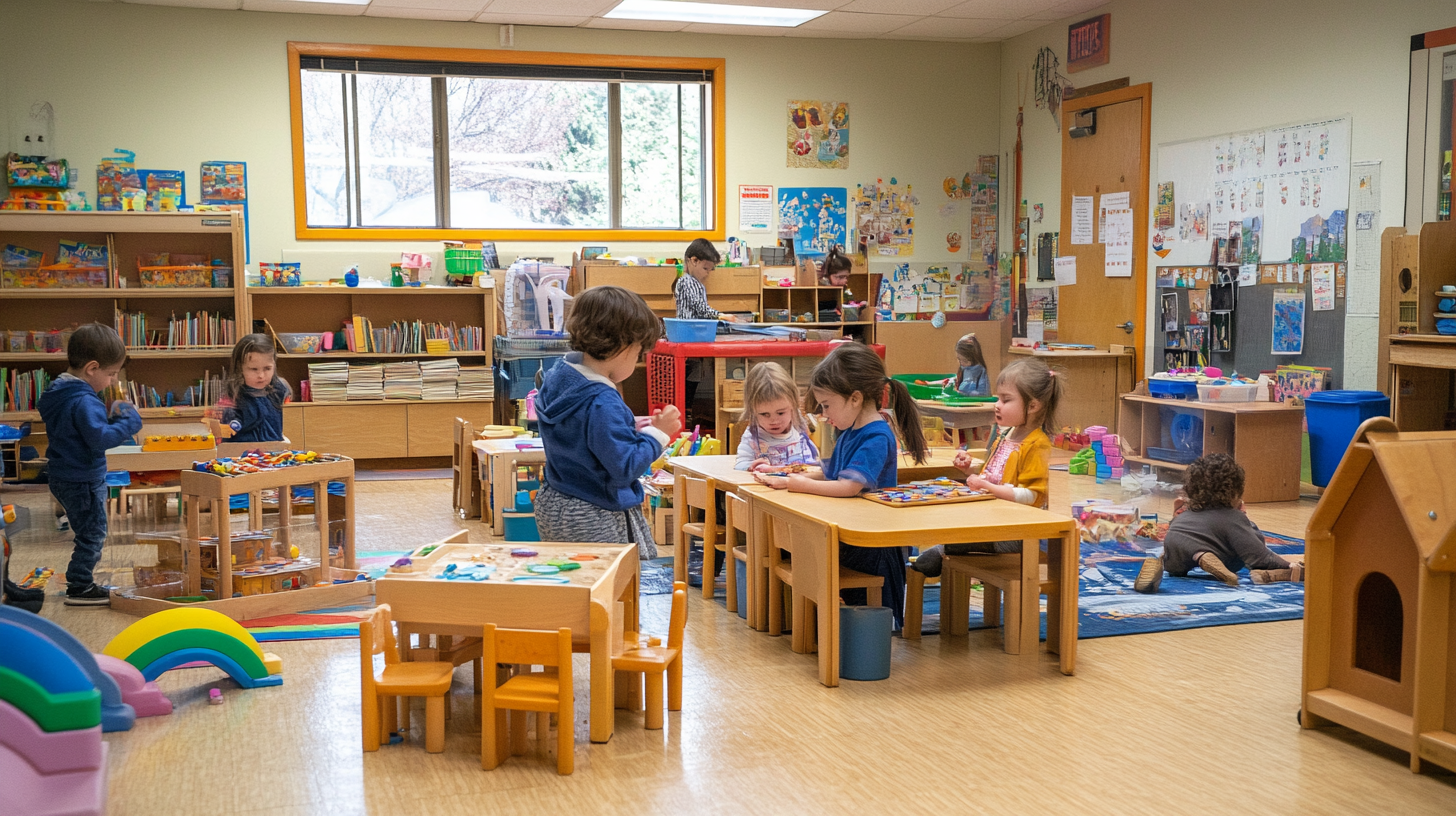Early childhood education is a critical phase in a child’s development, laying the foundation for lifelong learning and success. During these formative years, children undergo rapid growth and development, making it essential to provide them with a supportive and enriching environment. Teachers play a pivotal role in this stage, shaping young minds and fostering an environment conducive to growth and exploration. As facilitators of learning, they are responsible for guiding children through their early experiences, helping them develop the skills and attitudes necessary for future success. This article delves into the importance of teachers in early childhood education, highlighting their impact and exploring alternative career paths for those with advanced degrees in the field. By understanding the multifaceted roles these educators play, we can appreciate their indispensable contributions to early childhood development.
Understanding the Role of Early Childhood Education Teachers
Early childhood education teachers are more than just caregivers; they are educators who specialize in the developmental needs of young children, typically from birth to eight years old. Their role extends beyond mere supervision, as they are tasked with nurturing the cognitive, emotional, social, and physical growth of children. By offering a balanced approach to education, these teachers ensure that children receive a well-rounded foundation. Their responsibilities extend beyond academic instruction to include emotional, social, and physical development. They are adept at identifying each child’s unique needs, tailoring their teaching methods to accommodate diverse learning styles and abilities. By creating a nurturing and stimulating environment, these educators help children develop essential skills such as communication, problem-solving, and empathy, which are crucial for their overall development.
Creating a Foundation for Learning
Teachers in early childhood education set the stage for learning by introducing basic concepts in literacy, numeracy, and science through age-appropriate activities. These foundational skills are crucial as they form the building blocks for more advanced learning in later years. By employing creative teaching strategies, such as storytelling, games, and hands-on activities, teachers make learning engaging and accessible for young children. By fostering a love for learning at an early age, teachers instill curiosity and a desire to explore the world around them. This early enthusiasm for learning not only boosts children’s confidence but also encourages them to become self-motivated learners who are eager to tackle new challenges as they grow.
Supporting Emotional and Social Development
In addition to academic instruction, early childhood education teachers play a vital role in supporting children’s emotional and social development. They create safe spaces where children feel valued and understood, promoting a sense of belonging and self-worth. By teaching children how to express their emotions, interact with peers, and develop friendships, teachers lay the groundwork for healthy emotional development. These interpersonal skills are essential for success in school and beyond, as they form the basis for effective communication and collaboration. Teachers model positive social behaviors and conflict resolution strategies, empowering children to navigate their social world with confidence and empathy.
Encouraging Physical Development
Physical development is another key aspect of early childhood education. Teachers provide opportunities for children to engage in physical activities that enhance motor skills, coordination, and overall health. Whether through structured play or free exploration, physical activity is integral to a child’s growth and well-being. By incorporating movement into daily routines, teachers help children develop a love for physical activity that can lead to lifelong health benefits. Additionally, physical play supports cognitive development by improving concentration, memory, and problem-solving abilities, highlighting the interconnectedness of physical and cognitive growth.

The Impact of Teachers on Early Education
The impact of teachers in early childhood education cannot be overstated. Their influence extends far beyond the classroom, shaping children’s attitudes toward learning and influencing their future success. Teachers serve as role models, mentors, and guides, fostering a positive learning experience that resonates with children throughout their lives. Research has shown that high-quality early childhood education can lead to improved academic performance, better social skills, and increased likelihood of pursuing higher education. By investing in skilled and passionate educators, we can create a generation of learners who are equipped to thrive in an ever-changing world.
Building a Positive Learning Environment
Teachers create a positive learning environment by establishing routines, setting clear expectations, and providing consistent support. This stability helps children feel secure and confident, allowing them to focus on learning and exploration. A structured yet flexible environment encourages children to engage actively in their learning journey, promoting independence and self-regulation. A positive learning environment also encourages children to take risks and make mistakes, fostering resilience and a growth mindset. By viewing challenges as opportunities for growth, children develop perseverance and adaptability, essential qualities for lifelong learning.
Individualized Instruction
Early childhood education teachers recognize that each child is unique, with their own strengths, interests, and learning styles. By tailoring instruction to meet individual needs, teachers ensure that all children have the opportunity to succeed. Differentiated instruction allows educators to provide targeted support, helping children overcome challenges and build on their strengths. This personalized approach helps children develop a sense of competence and autonomy, which are crucial for motivation and engagement. When children feel understood and valued, they are more likely to embrace learning with enthusiasm and curiosity.
The Role of Play in Learning
Play is a fundamental component of early childhood education, serving as a vehicle for learning and development. Teachers skillfully integrate play into the curriculum, using it as a tool to teach academic concepts, social skills, and problem-solving strategies. Through play, children learn to experiment, explore, and discover, laying the groundwork for lifelong learning. Play encourages creativity and imagination, allowing children to express themselves and make sense of the world around them. By facilitating rich play experiences, teachers nurture a love for learning that transcends the classroom and inspires a lifelong quest for knowledge.

Career Opportunities for Teachers with a Master’s in Early Childhood Education
For those with a master’s degree in early childhood education, numerous career opportunities exist beyond traditional classroom teaching. These roles allow educators to leverage their expertise and passion for early childhood development in diverse settings. With advanced training, professionals can influence policy, lead educational initiatives, and conduct research that shapes the future of early childhood education.
Curriculum Developer
Curriculum developers design educational programs and materials tailored to the needs of young learners. By researching best practices and collaborating with educators, they create engaging and effective curricula that support children’s growth and learning. This role requires a deep understanding of child development and pedagogy, as well as creativity in crafting resources that resonate with both teachers and students. Curriculum developers play a crucial role in ensuring that educational content is both relevant and accessible, adapting to the evolving needs of children and the educational landscape.
Early Childhood Education Consultant
Consultants work with schools, childcare centers, and organizations to improve the quality of early childhood education programs. They provide guidance on curriculum development, teacher training, and program evaluation, helping institutions enhance their educational offerings. This role involves staying abreast of current research and trends in early childhood education, allowing consultants to offer informed and actionable advice. By collaborating with educators and administrators, consultants drive positive change, ensuring that early childhood programs meet the highest standards of quality and effectiveness.
Educational Administrator
Educational administrators oversee the operation of schools and early childhood education centers, ensuring that programs run smoothly and meet regulatory standards. They manage budgets, hire staff, and implement policies to create a supportive and effective learning environment. This leadership role requires strong organizational and interpersonal skills, as administrators work closely with teachers, parents, and community stakeholders. By fostering a culture of collaboration and continuous improvement, educational administrators contribute to the success and sustainability of educational institutions.
Childcare Center Director
Childcare center directors are responsible for the overall management of childcare facilities, including staffing, budgeting, and program development. They work closely with teachers and parents to ensure that children receive high-quality care and education. Directors must balance administrative duties with a commitment to creating a nurturing and enriching environment for children. Through strategic leadership and effective communication, childcare center directors build strong teams and foster partnerships that enhance the quality of care and education provided.
Researcher
Researchers in early childhood education study various aspects of child development and learning, contributing to the field’s knowledge base. Their work informs educational practices and policies, ultimately benefiting children and educators alike. Researchers may conduct studies on topics such as language development, socio-emotional learning, or the impact of technology in the classroom. By translating research findings into practical applications, researchers help bridge the gap between theory and practice, driving innovation and progress in early childhood education.
Conclusion
Teachers in early childhood education are instrumental in shaping the future of young learners. Through their dedication and expertise, they create a foundation for lifelong learning and success. As we recognize the importance of these educators, we must also explore and support the diverse career paths available to those with advanced degrees in early childhood education. By doing so, we can ensure that all children have access to high-quality education and the opportunity to reach their full potential. Investing in the professional growth of early childhood educators is an investment in our collective future, paving the way for a society that values and nurtures its youngest members.
Contact Discovery Time Learning Center
If you are passionate about early childhood education and want to learn more about how our dedicated teachers can make a difference in your child’s life, we invite you to reach out to us at Discovery Time Learning Center. Our team is here to answer your questions, provide information about our programs, and discuss how we can support your child’s development.
Get in touch with us today! Together, let’s create a nurturing environment for your child’s growth and learning!



